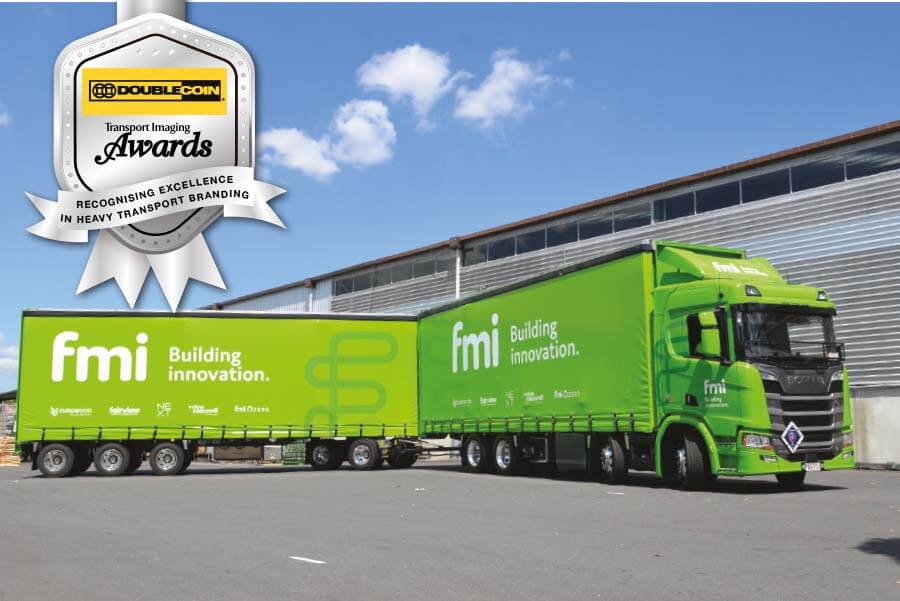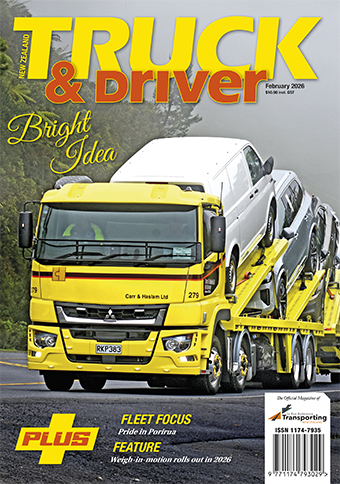Double Coin Imaging Awards


Green Innovation
Double Coin Imaging Awards
Mainstream New Zealand is well known for its near-black and yellow colours – with more than 200 trucks on its fleet - but is stepping up to provide a green solution for a key customer.
A bold all-green truck and trailer livery and a sustainability message are the story behind a fleet of five new Scania R 650s that are carrying FMI Building Innovation branding as Mainstream delivers a dedicated nationwide freight service to the building supplies manufacturer.
The 8x4 R 650 and five-axle trailer combinations with trucks and curtain siders in vivid green are certain to turn heads on the highway.
FMI – Fairview Metal industries – is a 53-year-old company with its origins in Timaru.
“My late father started the company in Timaru in 1968 and an electrical fault burned his business to the ground in its first year. He ended up manufacturing windows and doors inside tents in a sheep paddock in the middle of winter,” says FMI managing director Warren Lewis.
“You can definitely say the company was born amid some adversity, but it has never looked back.
Mainstream New Zealand is well known for its near-black and yellow colours – with more than 200 trucks on its fleet - but is stepping up to provide a green solution for a key customer.
A bold all-green truck and trailer livery and a sustainability message are the story behind a fleet of five new Scania R 650s that are carrying FMI Building Innovation branding as Mainstream delivers a dedicated nationwide freight service to the building supplies manufacturer.
The 8x4 R 650 and five-axle trailer combinations with trucks and curtain siders in vivid green are certain to turn heads on the highway.
FMI – Fairview Metal industries – is a 53-year-old company with its origins in Timaru.
“My late father started the company in Timaru in 1968 and an electrical fault burned his business to the ground in its first year. He ended up manufacturing windows and doors inside tents in a sheep paddock in the middle of winter,” says FMI managing director Warren Lewis.
“You can definitely say the company was born amid some adversity, but it has never looked back.
“Even 50-odd years ago the company focus was sustainability. Today it’s energy efficiency, zero-carbon and zero-waste. FMI is a green brand.”
Hence the appropriate choice of a standout green livery for the new Scania fleet.
“I call it Kermit Green. It’s been a Fairview colour for more than 50 years,” says Lewis.
“And all of the FMI brand logos have been put on the trucks in white signwriting so as not to confuse the whole message.”
Those brands are Fairview, Eurowood, NEXT and Vetro Raccordi.
The green fleet will see two of the Scania’s on the road in the South Island running between Nelson and Invercargill from a Christchurch base. The other three are set for North Island duties with destinations as far afield as Kaitaia and Wellington.
The new trucks and trailers have been custom-designed to look after fragile cargo and carry a variety of FMI products.
“The main thing they will carry are profiles – the aluminium extrusions that our customers manufacture into windows and doors,” Lewis says.
“But they also carry the glazing for those products, so these rigs are custom designed and configured by Mainstream and Fruehauf specifically for carrying glass products.
“They also carry accessories like handles, fittings and screws and the fourth thing they are moving are our prefabricated products - mainly front entry doors plus some louvres and aluminium fencing products we manufacture.”
It’s a new departure for Mainstream trucks not to be in the company’s familiar black and yellow colours.
“That reflects a 25-year relationship with FMI and their long-term commitment to a direct load-direct delivery service,” says Mainstream managing director Greg Haliday.
Mainstream worked together with Fruehauf to design the most efficient truck and trailer for FMI’s requirements.
“The trucks and trailers feature a mezzanine floor throughout with the idea to carry the lighter aluminium products above the A-frame ‘frails’ that carry the glass,” Haliday says
“The measurements have been very carefully calculated to optimise the loading of the trucks so as to perfectly fit the various increments of the frails and frames. There is no lost space, even for over-length and over-height glass.
“The mezzanine floors are also perforated. It not only saves weight but allows a forklift driver to see exactly where they are positioning their forks.”
Haliday says the network and timetable for the trucks is complex.
“It’s a very sophisticated and very efficient solution. The trucks will do huge kilometres, and, in some cases, they are triple-shifted.”
The idea is to have a timetable that provides FMIs customers with a daily delivery service.
Selecting the latest generation Euro 6 Scania models is another aspect in the “green” focus of the project.
“For the last couple of years almost every truck we have bought has been Euro 6. We don’t buy anything else now,” says Haliday.
“We recently had our carbon footprint measured and are now working on our strategy with experts in this field to make Mainstream carbon neutral by 2030.”
Jeff Mear, national sales manager for Fruehauf says the design and build was a challenging project.
“Because FMI supplies smaller local window manufacturers in tight, small industrial areas, the truck is used as the primary delivery vehicle rather than the trailer,” he says.
The design called for the truck to cart the maximum legal amount of frails, so the Scania has the maximum allowable length for a towing vehicle with a 9.5m body.
“The challenging bit was ensuring axle weights and the loading wasn’t compromised. Working with Scania, we were able set the required wheelbase length ex-factory,” says Mear.
The colour scheme and livery required plenty of to-and-fro to get the correct shading, specifically matching the curtains which is an ink colour. TCC provided the graphics on the truck cab and Structurflex the livery on the curtains. Royans painted the distinctive lime green cab.
“The result stands for itself – they look great on the road,” says Mear.
The trucks will work nationwide delivering to FMI’s customers factories making joinery and glazing products.
“We have about 60 customers to deliver to. One of the benefits of going to dedicated trucks is we no longer have to send product as general freight,” says Lewis.
“Before, if we sent something to Invercargill it might have to be offloaded multiple times. So, we are looking to eliminate as much handling and risk as possible to achieve a reduction in the level of damage.
“A dedicated cartage solution will cost us more, but if we reduce the amount of damage and can deliver our customers a more efficient service, then it’s worthwhile,” says Lewis.



 + EQUIPMENT GUIDE - FREE
+ EQUIPMENT GUIDE - FREE
